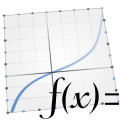In computing, a desktop environment (DE) is an implementation of the desktop metaphor made of a bundle of programs running on top of a computer operating system that share a common graphical user interface (GUI), sometimes described as a graphical shell. The desktop environment was seen mostly on personal computers until the rise of mobile computing. Desktop GUIs help the user to easily access and edit files, while they usually do not provide access to all of the features found in the underlying operating system. Instead, the traditional command-line interface (CLI) is still used when full control over the operating system is required.

Gambas is the name of an object-oriented dialect of the BASIC programming language, as well as the integrated development environment that accompanies it. Designed to run on Linux and other Unix-like computer operating systems, its name is a recursive acronym for Gambas Almost Means Basic. Gambas is also the word for prawns in the Spanish, French, and Portuguese languages, from which the project's logos are derived.

Amarok is a free and open-source music player for Linux, macOS, Windows, and other Unix-like operating systems. Amarok is part of the KDE project, but it is released independently of the central KDE Software Compilation release cycle. Amarok is released under the terms of the GPL-2.0-or-later.

Kubuntu is an official flavor of the Ubuntu operating system that uses the KDE Plasma Desktop instead of the GNOME desktop environment. As part of the Ubuntu project, Kubuntu uses the same underlying systems. Kubuntu shares the same repositories as Ubuntu and is released regularly on the same schedule as Ubuntu.
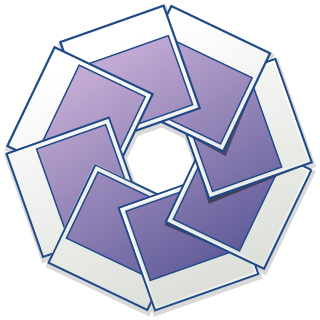
F-Spot is a discontinued image organizer, that was designed to provide personal photo management for the GNOME desktop environment. The name is a play on the word F-Stop. F-Spot can be used for basic photo editing and management.

KCalc is a scientific software calculator integrated with the KDE Gear.
HAL is a software subsystem for UNIX-like operating systems providing hardware abstraction.
A desktop environment is a collection of software designed to give functionality and a certain look and feel to an operating system.

Linux Mint is a community-driven Linux distribution based on Ubuntu, bundled with a variety of free and open-source applications. It can provide full out-of-the-box multimedia support for those who choose to include proprietary software such as multimedia codecs. Linux Mint can come with three different desktop environments by default; Cinnamon, Xfce, and MATE.
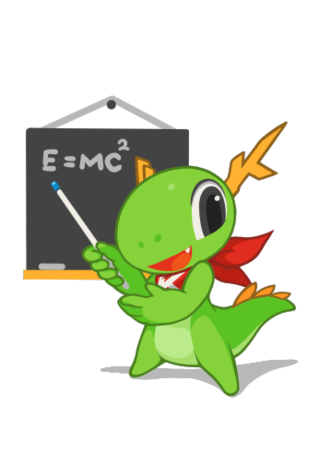
The KDE Education Project develops free educational software based on the KDE technologies for students and parents. These educational software is translated into more than 65 languages, so that users can access them without any problems. The KDE-Edu project also provides free software educational to support and facilitate teachers in planning lessons.

LightDM is a free and open-source X display manager that aims to be lightweight, fast, extensible and multi-desktop. It can use various front-ends to draw the user interface, also called Greeters. It also supports Wayland.
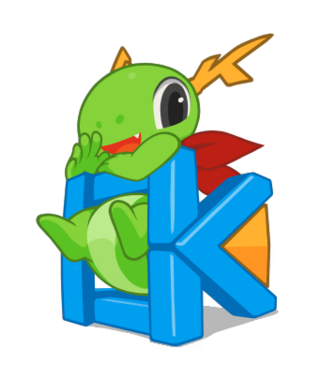
KDE Frameworks is a collection of libraries and software frameworks readily available to any Qt-based software stacks or applications on multiple operating systems. Featuring frequently needed functionality solutions like hardware integration, file format support, additional graphical control elements, plotting functions, and spell checking, the collection serves as the technological foundation for KDE Plasma and KDE Gear. It is distributed under the GNU Lesser General Public License (LGPL).
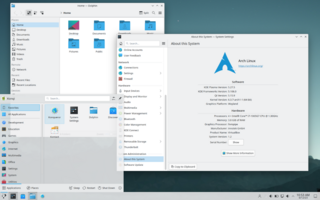
KDE Plasma 5 is the fifth generation of the KDE Plasma graphical workspaces environment, created by KDE primarily for Linux systems. KDE Plasma 5 is the successor of KDE Plasma 4 and was first released on 15 July 2014. It was succeeded by KDE Plasma 6 on 28 February 2024.

The KDE Gear is a set of applications and supporting libraries that are developed by the KDE community, primarily used on Linux-based operating systems but mostly multiplatform, and released on a common release schedule.

Snap is a software packaging and deployment system developed by Canonical for operating systems that use the Linux kernel and the systemd init system. The packages, called snaps, and the tool for using them, snapd, work across a range of Linux distributions and allow upstream software developers to distribute their applications directly to users. Snaps are self-contained applications running in a sandbox with mediated access to the host system. Snap was originally released for cloud applications but was later ported to also work for Internet of Things devices and desktop applications.

KDE neon is a Linux distribution developed by KDE based on Ubuntu long-term support (LTS) releases, bundled with a set of additional software repositories containing the latest versions of the Plasma 6 desktop environment/framework, Qt 6 toolkit and other compatible KDE software. First announced in June 2016 by Kubuntu founder Jonathan Riddell following his departure from Canonical Ltd., it has been adopted by a steadily growing number of Linux users, regularly appearing in the Top 20 on DistroWatch.com's popularity tables.

KDE Connect is a multi-platform application developed by KDE, which facilitates wireless communications and data transfer between devices over local networks. KDE Connect is available in the repositories of many Linux Distributions and F-Droid, Google Play Store for Android. Often, distributions bundle KDE Connect in their KDE Plasma desktop variant. KDE Connect has been reimplemented in the GNOME desktop environment as GSConnect, which can be obtained from Gnome Extension Store. Since 2021, KDE connect has also been available on Windows, and it is available as an unstable nightly build on macOS.
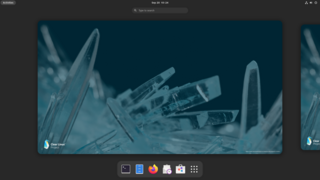
Clear Linux OS is a Linux distribution, developed and maintained on Intel's 01.org open-source platform, and optimized for Intel's microprocessors with an emphasis on performance and security. Its optimizations are also effective on AMD systems. Clear Linux OS follows a rolling release model. Clear Linux OS is not intended to be a general-purpose Linux distribution; it is designed to be used by IT professionals for DevOps, AI application development, cloud computing, and containers.

Q4OS is a light-weight Linux distribution, based on Debian, targeted as a replacement for operating systems that are no longer supported on outdated hardware. The distribution is known for an addon called XPQ4, which adds themes intended to replicate the look and feel of Windows 2000 and Windows XP.
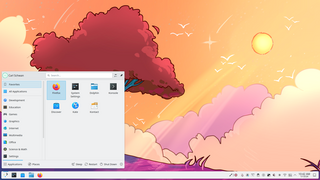
Plasma is a set of graphical shells developed by KDE for Unix-like operating systems. With the KDE brand repositioning in 2009, Plasma 4.4 succeeded KDE 4.3. Currently, it has four workspace variants: one for desktop PCs and laptops, one for TVs, one for smartphones, and another for embedded and touch-enabled devices. Plasma Desktop, in its default configuration, resembles KDesktop from K Desktop Environment 3 and Microsoft Windows XP; however, extensive configurability allows radical departures from the default layout.
